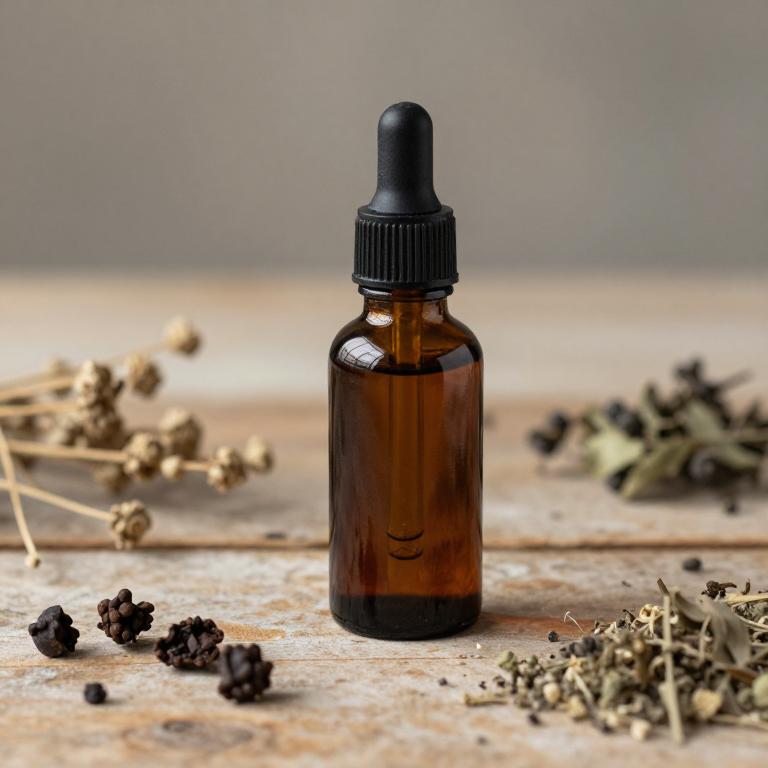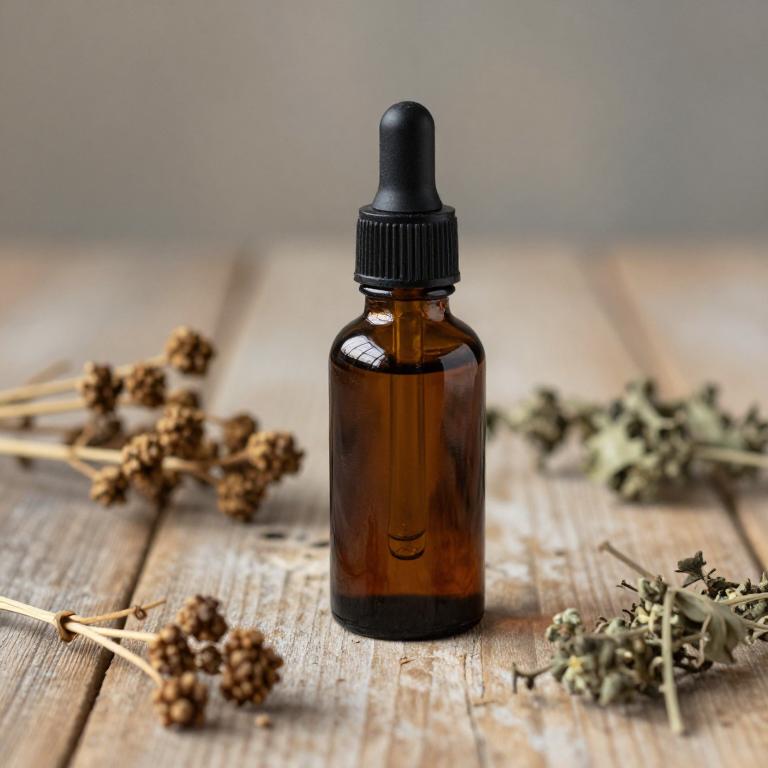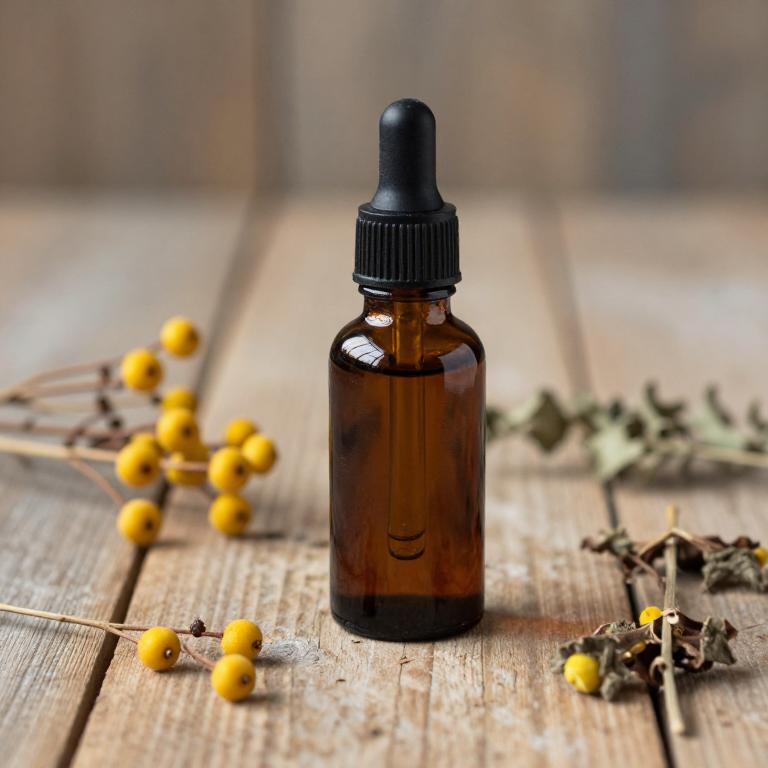10 Best Herbal Tinctures For Cirrhosis

Herbal tinctures are concentrated liquid extracts made from various plant materials and are sometimes used as complementary therapies for cirrhosis, a chronic liver disease characterized by scarring of the liver tissue.
While some herbs, such as milk thistle (Silybum marianum), are believed to have hepatoprotective properties that may support liver function, their effectiveness in treating cirrhosis remains inconclusive and requires further scientific validation. It is important to note that herbal tinctures should not replace conventional medical treatments for cirrhosis, as they may interact with prescription medications or exacerbate liver damage. Patients considering herbal tinctures should consult with healthcare professionals to ensure safety and appropriateness for their specific condition.
Due to limited clinical evidence, herbal tinctures are generally recommended as adjunctive rather than primary treatments for cirrhosis.
Table of Contents
- 1. Thistle (Silybum marianum)
- 2. Turmeric (Curcuma longa)
- 3. Blessed thistle (Cnicus benedictus)
- 4. False leaf (Phyllanthus amarus)
- 5. Licorice (Glycyrrhiza glabra)
- 6. Dandelion (Taraxacum officinale)
- 7. St. john's wort (Hypericum perforatum)
- 8. Stinging nettle (Urtica dioica)
- 9. Ginger (Zingiber officinale)
- 10. Indian barberry (Berberis aristata)
1. Thistle (Silybum marianum)

Silybum marianum, commonly known as milk thistle, is a herbal remedy that has been traditionally used to support liver health.
Its active compound, silymarin, is believed to have antioxidant, anti-inflammatory, and antifibrotic properties, making it a popular choice for individuals with liver conditions such as cirrhosis. Herbal tinctures of Silybum marianum are often used as a complementary therapy to help protect liver cells and promote regeneration in patients with cirrhosis. While some studies suggest potential benefits, more clinical research is needed to fully establish its efficacy and safety in treating liver disease.
As with any herbal supplement, it is important to consult a healthcare provider before use, especially for those with existing medical conditions or on medications.
2. Turmeric (Curcuma longa)

Curcuma longa, commonly known as turmeric, has been traditionally used for its anti-inflammatory and antioxidant properties, and its herbal tinctures have shown potential in supporting liver health.
Studies suggest that curcumin, the active compound in turmeric, may help reduce inflammation and oxidative stress, which are key factors in the progression of cirrhosis. While not a cure, curcuma longa tinctures may complement conventional treatments by promoting liver regeneration and improving detoxification processes. However, it is important to consult a healthcare provider before using these tinctures, as they can interact with medications and may not be suitable for all individuals.
Overall, curcuma longa tinctures offer a natural adjunct therapy that may support liver function in patients with cirrhosis when used under professional guidance.
3. Blessed thistle (Cnicus benedictus)

CNICUS BENEDICTUS, also known as blessed thistle, is a herbal tincture that has been traditionally used to support liver health and may offer potential benefits for individuals with cirrhosis.
This herb is believed to stimulate bile production and aid in the detoxification process, which can be particularly beneficial for those with impaired liver function. While there is limited scientific evidence supporting its efficacy for cirrhosis, some studies suggest it may help reduce inflammation and promote liver regeneration. It is often used as a complementary therapy alongside conventional treatments, but it should not replace medical advice or prescribed medications.
As with any herbal remedy, it is important to consult a healthcare professional before use, especially for individuals with severe liver conditions.
4. False leaf (Phyllanthus amarus)

Phyllanthus amarus, commonly known as stonebreaker or cheesewood, has been traditionally used in herbal medicine for its potential hepatoprotective properties.
Herbal tinctures made from Phyllanthus amarus are believed to support liver function and may aid in the management of cirrhosis by promoting the regeneration of liver cells. These tinctures are often prepared by soaking the dried plant parts in alcohol to extract bioactive compounds such as flavonoids and alkaloids. While some preliminary studies suggest possible benefits, more clinical research is needed to confirm their efficacy and safety in treating cirrhosis.
As with any herbal treatment, it is important to consult a healthcare professional before using Phyllanthus amarus tinctures, especially for individuals with existing liver conditions.
5. Licorice (Glycyrrhiza glabra)

Glycyrrhiza glabra, commonly known as licorice root, has been traditionally used in herbal medicine for its potential therapeutic properties.
Glycyrrhiza glabra herbal tinctures are often considered for their anti-inflammatory and antiviral effects, which may support liver health. In the context of cirrhosis, these tinctures may help reduce inflammation and oxidative stress, potentially aiding in liver regeneration. However, due to the presence of glycyrrhizin, long-term use can lead to side effects such as hypertension and electrolyte imbalances.
As a result, glycyrrhiza glabra tinctures should be used under the guidance of a healthcare professional, especially for individuals with liver disease.
6. Dandelion (Taraxacum officinale)

Taraxacum officinale, commonly known as dandelion, has been traditionally used in herbal medicine for its potential liver-supporting properties.
Herbal tinctures made from Taraxacum officinale are often utilized in the management of cirrhosis due to their purported ability to promote bile production and detoxification. These tinctures may help alleviate symptoms such as fluid retention and jaundice by supporting liver function and reducing inflammation. However, it is important to note that while some studies suggest possible benefits, scientific evidence remains limited, and these remedies should not replace conventional medical treatments.
Individuals with cirrhosis should consult with a healthcare provider before using any herbal tinctures to ensure safety and appropriateness for their condition.
7. St. john's wort (Hypericum perforatum)

Hypericum perforatum, commonly known as St. John's wort, is a herbal plant traditionally used for its potential medicinal properties.
While primarily recognized for its use in treating mild to moderate depression, some studies suggest that its active compounds, such as hypericin and hyperforin, may have hepatoprotective effects. However, it is important to note that there is limited scientific evidence specifically supporting the use of St. John's wort tinctures in the treatment of cirrhosis. Due to its potential to interact with various medications, including those used in managing liver disease, its use in patients with cirrhosis should be approached with caution and under the guidance of a healthcare professional.
As a result, while hypericum perforatum tinctures may be considered as a complementary therapy, they are not a substitute for conventional medical treatments for cirrhosis.
8. Stinging nettle (Urtica dioica)

Urtica dioica, commonly known as stinging nettle, has been traditionally used in herbal medicine for its potential health benefits, including support for liver function.
Herbal tinctures made from Urtica dioica are sometimes used as a complementary therapy for individuals with cirrhosis, a condition characterized by scarring of the liver. These tinctures are believed to help detoxify the liver and promote the regeneration of liver cells due to their high concentration of antioxidants and anti-inflammatory compounds. However, it is important to note that while some preliminary studies suggest possible benefits, there is limited scientific evidence supporting the efficacy of Urtica dioica tinctures in treating cirrhosis.
As with any herbal remedy, it should be used under the guidance of a healthcare professional, especially for those with severe liver disease.
9. Ginger (Zingiber officinale)

Zingiber officinale, commonly known as ginger, has been traditionally used for its anti-inflammatory and hepatoprotective properties, making it a potential candidate for herbal tinctures in the management of cirrhosis.
These tinctures may help reduce liver inflammation and support detoxification processes by enhancing bile production and improving circulation. Studies suggest that ginger's active compounds, such as gingerol and shogaol, may aid in preventing further liver damage and promoting regeneration of liver cells. However, while some preliminary research supports its use, more clinical trials are needed to confirm its efficacy and safety in cirrhosis patients.
It is important to consult a healthcare professional before using ginger tinctures as a complementary therapy for liver disease.
10. Indian barberry (Berberis aristata)

Berberis aristata, also known as Indian barberry, contains active compounds like berberine, which have been studied for their potential hepatoprotective effects.
Herbal tinctures made from Berberis aristata are sometimes used as complementary therapy for cirrhosis due to their anti-inflammatory and antioxidant properties. These tinctures may help reduce liver inflammation and support detoxification processes in patients with liver disease. However, it is important to note that they should not replace conventional medical treatments and should be used under the guidance of a healthcare professional.
While some preliminary research suggests possible benefits, more clinical studies are needed to fully understand their efficacy and safety in managing cirrhosis.